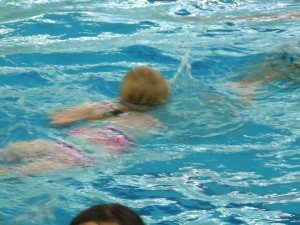 My daughter’s swim season is drawing to a close. After 3 months of breathing chlorine fumes and sweating through sunscreen, I can see many similarities between swimming and writing.
My daughter’s swim season is drawing to a close. After 3 months of breathing chlorine fumes and sweating through sunscreen, I can see many similarities between swimming and writing.
Technique & Form
Technique is important for swimming. The way your hands enter the water, the precision of your kicks, how you position your head, all combine to power you smoothly through the water.
Technique is equally important in writing. The choice of words, precision of punctuation, flow of elements such as dialogue and metaphor, all combine to bring your voice to life and give the readers a smooth experience.
Technique can also be called “form”. Writing has different forms as well, from poetry to novels. Writers need to master the structure and expectations of their form and genre.
Stamina & Muscle Memory
Incessant laps in the pools increase a swimmer’s stamina. Hours of repetitive practice ingrain the techniques in muscle memory, enabling swimmers to swim faster without having to concentrate so hard in their movements.
Writers who practice their craft also build up stamina, so they can plow through the tough times to get to the end of a novel. Careful study and repetitive practice of techniques store them in a writer’s subconscious so they come easily, allowing the writing process to flow faster and the writer to seamlessly weave the elements together.
Breathing
Swimmers who don’t master breathing will run out of oxygen before the end of a race. Similarly, writers who don’t step away once in a while and recharge risk burning out on longer projects.
Like swimming, mastering writing takes hours of practice to build up those creative muscles, coaches to help you perfect technique, and a cheering section to get you through the hard times.
So pick up your pen, stroke out boldly, and don’t forget to breathe.
Stamina–CoronaLife Day 607
Every day at bedtime, my daughter complains that her legs ache. This is not a surprise. After 18 months of mostly being home, combined with being on crutches all of August and in an ankle brace all of September, she is tremendously out of shape. That 40 minutes of exercise in gym every day has her muscles balking.
I sit here watching her swim laps, working on her endurance with the rest of her class…and I realize she is not the only one in need of more stamina.
My daily fatigue has been with me since the pandemic started, and I attributed a lot of it to my anxiety levels being through the roof. My anxiety often manifests as deep fatigue. Add to that the fact that I often only get about 6 hours of sleep a night, and it made sense.
But now I think there is another factor. As we move back to a more normal-ish existence, I am going out more. Socializing more. Interacting more.
And my mental and social muscles are flabby. I have no stamina.
The 45 minute drive to my folks’ house, which used to be nothing, is a grueling trek.
Going to a meeting in person makes me want to hibernate.
Focusing for 4 hours at an online conference drains me.
I need to build my stamina again.
I find myself working in bursts, trading spurts of productivity with times of scrolling mindlessly online or napping.
Concentration and socializing skills need exercise to stay in shape. This is the “learning loss” I have experienced during this upheaval.
While my daughter works on her swimming endurance, I will continue to work on getting myself back in mental shape.
I hope I can, because I am tired of not feeling like myself. It will take work, time, and patience–which is just another way of saying stamina.